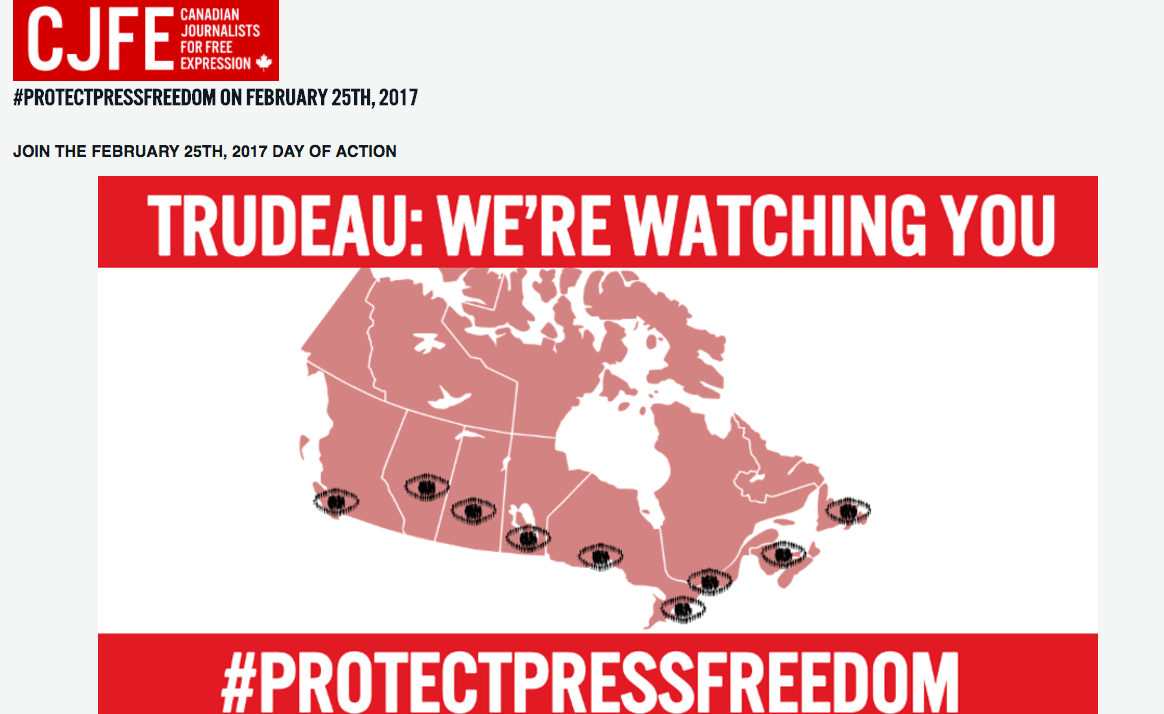Upcoming Day of Action calls for protections for journalists
By Grant Buckler
A Day of Action set for February 25 will call for an end to mass surveillance, repeal of the Anti-Terrorism Act and new legislation to protect activists, whistleblowers and journalists.
The Day of Action was originally to have taken place February 4, but was delayed to avoid conflicts with mass demonstrations against U.S. President Donald Trump’s travel ban barring citizens of seven predominantly Muslim countries from entered the United States, and because of shootings at a Quebec City mosque earlier that week.
Organized by Canadian Journalists for Free Expression, Vice Media Canada, the Fédération professionnelle des journalistes du Québec, Leadnow, CWA/SCA Canada, Rabble.ca, OpenMedia, Unifor and Reporters Without Borders, the Day of Action is planned to include demonstrations across mass surveillancethe country.
Gatherings are currently planned for Toronto, Montreal, Vancouver, Ottawa, St. John’s and London, Ont. Several hundred people are expected at the Toronto event in Trinity-Bellwoods Park, said Duncan Pike, campaigns and advocacy co-ordinator at CJFE.
The organizers say they are concerned about police spying on several journalists in Quebec , spying on Indigenous activists by the RCMP and ongoing rights abuses against Muslims. Another concern is the RCMP’s attempt to obtain notes and other information from Vice News reporter Ben Makuch concerning interviews he conducted with Farah Shirdon, a Canadian member of the Islamic State. Another is charges against Justin Brake, editor of TheIndependent.ca, for breaking a court injunction while covering protests in Labrador.
“An accumulation of events over the past year,” prompted the Day of Action, said Margaux Ewen, advocacy and communications coordinator for the North American office of Reporters Without Borders in Washington, D.C. “We want to help amplify these issues in Canada because if these kinds of issues can happen in Canada they can happen anywhere.”
Through the demonstrations, online actions and lobbying members of Parliament, the Day of Action will call for an end to spying on journalists and others and creation of watchdog agencies for privacy and security.
It will support Private Member’s Bill C-303 , proposed by NDP MP Randall Garrison in September 2016, that seeks a line-by-line repeal of the Anti-Terrorism Act of 2015 , widely known as Bill C-51.
It will also support another Private Member’s Bill, S-231, aimed at creating a press shield law and strengthening protection for activists, whistleblowers and journalists. Conservative Senator Claude Carignan proposed the bill in November 2016. According to CJFE 70 per cent of Canadians support creating a press shield law, which is legislation to protect reporters’ right to refuse to testify about information or sources of information obtained in the news-gathering process. Some U.S. states and many other Western democracies have shield laws, but Canada does not.
CJFE conducted a week of lobbying in January on issues the Day of Action addresses, and Pike recently met with Senators Carignan and Jim Munson to discuss Bill S-231.
Pike said CJFE is not optimistic that Bill C-51 will be fully repealed but is hopeful the government will introduce legislation this spring to change some of the more problematic aspects of the law, as it promised before being elected.
The United States has recently seen “aggressive attacks on the fundamental principles of media freedom,” Pike said. “In many ways the press in the U.S. has far stronger laws protecting it than we do in Canada, and it would be foolish to think that Canada is immune to the kind of politics Trump is practicing. We have a Prime Minister who is rhetorically very committed to the importance of media freedom; what we’re calling for now is action to back that up.”
Ewen said her organization is also “very concerned” about the Donald Trump administration’s verbal attacks on the media, and that if the U.S. president gets away with such behaviour, Canadian politicians might be encouraged to think they can too.
Grant Buckler is a retired freelance journalist and a volunteer with Canadian Journalists for Free Expression and lives in Kingston, Ont.
Grant Buckler is a retired freelance journalist and a volunteer with Canadian Journalists for Free Expression and lives in Kingston, Ont.


